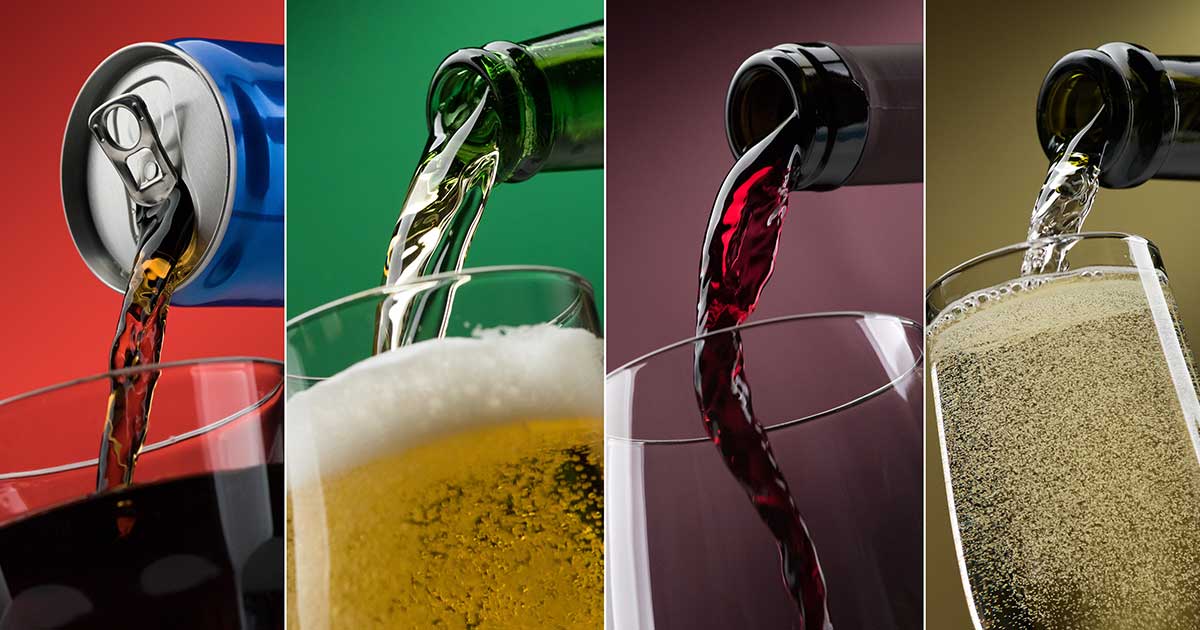 In pursuing optimal health, the focus often gravitates toward food, inadvertently sidelining the beverages we consume regularly. Yet, these drinks, ranging from the seemingly benign to the overtly indulgent, play a crucial role in our health ecosystem, particularly concerning brain function. This comprehensive analysis delves into the nuanced relationship between certain popular beverages and brain health, highlighting the potential risks they pose, including their link to conditions such as Alzheimer’s disease. By dissecting the impact of diet sodas, alcohol, and sports/energy drinks, we aim to provide a detailed perspective on making informed choices that favor general well-being and cognitive longevity.
In pursuing optimal health, the focus often gravitates toward food, inadvertently sidelining the beverages we consume regularly. Yet, these drinks, ranging from the seemingly benign to the overtly indulgent, play a crucial role in our health ecosystem, particularly concerning brain function. This comprehensive analysis delves into the nuanced relationship between certain popular beverages and brain health, highlighting the potential risks they pose, including their link to conditions such as Alzheimer’s disease. By dissecting the impact of diet sodas, alcohol, and sports/energy drinks, we aim to provide a detailed perspective on making informed choices that favor general well-being and cognitive longevity.
Diet Sodas: Unveiling the Truth Behind Artificial Sweeteners
The allure of diet sodas lies in their promise of indulgence without the caloric guilt, primarily facilitated by artificial sweeteners like aspartame. This appeal, however, masks a complex reality. Despite their role in calorie control, these sweeteners carry implications for brain health that cannot be ignored. Research has illuminated the paradoxical relationship between artificial sweeteners and the risk of diabetes, a condition intrinsically linked to cognitive decline and the development of Alzheimer’s, sometimes referred to as “type 3 diabetes” due to its profound connection with cerebral sugar metabolism.[1][2][3] The crux of the issue lies in insulin resistance, a condition exacerbated by these sweeteners, which, despite their ‘sugar-free’ label, disrupt the body’s glucose regulation mechanisms, setting a covert pathway to cognitive impairments.
Alcohol: Cultural Staple with Concealed Cognitive Costs
Alcohol’s embeddedness in social fabric and rituals belies its potential cognitive hazards, especially when consumed excessively. Its immediate effects on mood and behavior are widely recognized, but the long-term implications for brain health are more insidious. Alcohol consumption disrupts the gut-brain axis, an essential communication network between the gastrointestinal system and the central nervous system, thereby impacting mental and cognitive health.[4] Moreover, alcohol places a significant burden on liver function, impeding its ability to detoxify the body and manage toxins, with direct repercussions for cognitive faculties.[5] The liver’s compromised efficiency can lead to a buildup of toxins in the blood, directly affecting brain function and increasing the risk of cognitive diseases.[6] Furthermore, alcohol’s interference with the prefrontal cortex disrupts decision-making processes and impulse control. At the same time, its negative effects on sleep quality undermine the brain’s detoxification processes, which are crucial for preventing cognitive decline.[7][8]
Sports and Energy Drinks: Misleading Health Halo
The popularity of sports and energy drinks, especially among the youth, is propelled by marketing narratives that tout them as elixirs of vitality and performance enhancement. This perception, however, is superficial, as the high sugar content in these beverages presents significant health risks. The rapid absorption of these sugars into the bloodstream can lead to spikes in insulin levels, fostering insulin resistance, a precursor to diabetes and a known risk factor for Alzheimer’s disease.[9] In addition to sugar, many of these drinks contain artificial sweeteners, which, as discussed, pose their own set of risks to brain health.[1][2] The cumulative effect of regularly consuming these beverages extends beyond immediate physical health concerns, posing substantial risks to cognitive function over time.
Understanding the Cumulative Impact
The dialogue around the impact of diet sodas, alcohol, and sports/energy drinks on brain health transcends theoretical speculation. A growing corpus of scientific evidence underscores the tangible cognitive risks associated with the ingredients and additives prevalent in these beverages. From fostering insulin resistance to impairing critical organ functions and disrupting essential biological processes, the ramifications are multifaceted and cumulative, potentially setting the stage for dementia and other cognitive disorders.
Towards Healthier Beverage Choices
In light of the potential risks associated with certain beverages, pivoting towards healthier alternatives becomes imperative. With its unmatched purity, water is the ideal choice for hydration. When consumed judiciously, herbal teas and natural fruit juices offer beneficial nutrients and antioxidants without the adverse effects associated with diet sodas, alcohol, and sports/energy drinks. However, safeguarding brain health is a holistic endeavor that extends beyond beverage choices, encompassing lifestyle factors such as regular exercise, a balanced diet, adequate sleep, and stress management, all of which are pivotal for cognitive well-being.
Conclusion
The intricate relationship between beverage consumption and brain health is profound and consequential. Diet sodas, alcohol, and sports/energy drinks, despite their widespread acceptance and perceived benefits, harbor potential risks that can lead to serious long-term cognitive consequences. We can mitigate these risks by embracing informed choices and fostering a lifestyle conducive to brain health, ensuring cognitive vitality and longevity. Remember, the beverages we choose can significantly influence our brain health trajectory, making mindfulness in our selections paramount.
References:
- Czarnecka, Kamila et al. “Aspartame-True or False? Narrative Review of Safety Analysis of General Use in Products.” Nutrients vol. 13,6 1957. 7 Jun. 2021, doi:10.3390/nu13061957
- Mathur, Kushagra, et al. “Effect of artificial sweeteners on insulin resistance among type-2 diabetes mellitus patients.” Journal of family medicine and primary care vol. 9,1 69-71. 28 Jan. 2020, doi:10.4103/jfmpc.jfmpc_329_19
- De la Monte, Suzanne M, and Jack R Wands. “Alzheimer’s disease is type 3 diabetes-evidence reviewed.” Journal of diabetes science and technology vol. 2,6 (2008): 1101-13. doi:10.1177/193229680800200619
- Gorky, Jonathan, and James Schwaber. “The role of the gut-brain axis in alcohol use disorders.” Progress in neuro-psychopharmacology & biological psychiatry vol. 65 (2016): 234-41. doi:10.1016/j.pnpbp.2015.06.013
- Nguyen, Henry H, and Mark




Leave a Reply
Your email is safe with us.